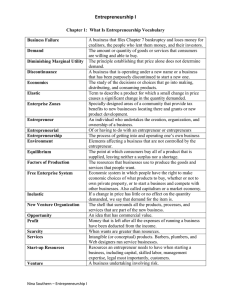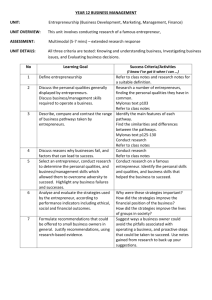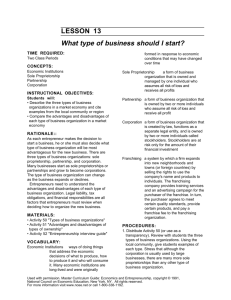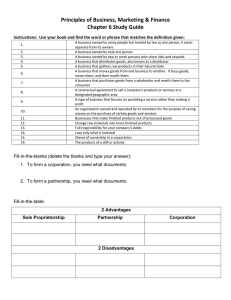Exam review
advertisement
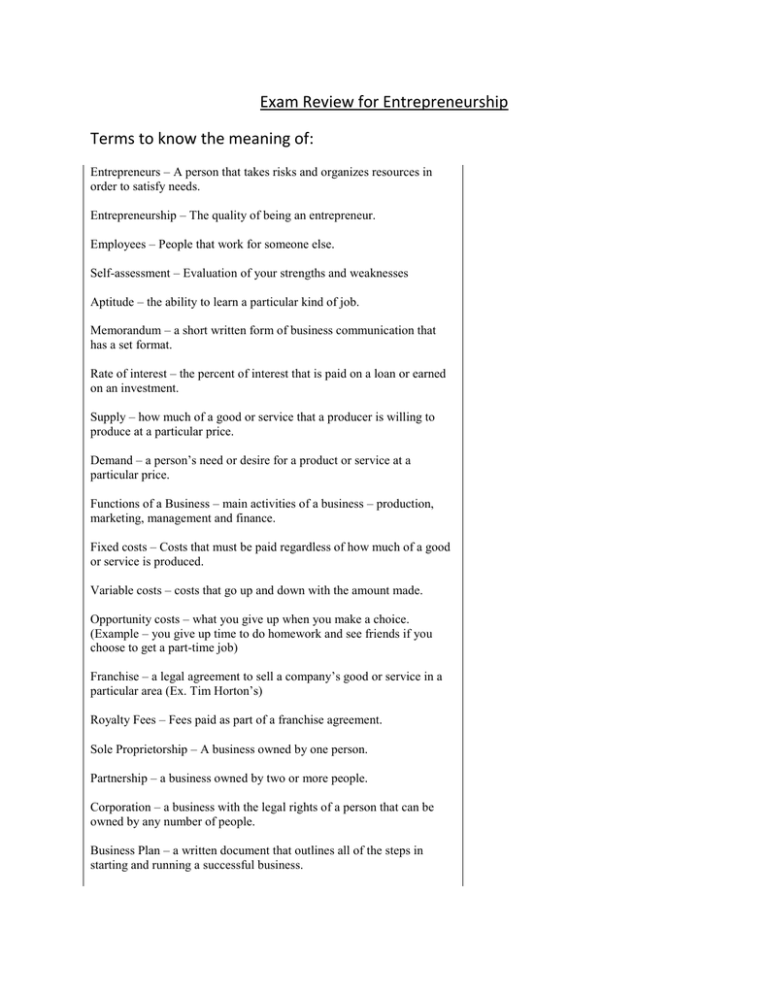
Exam Review for Entrepreneurship Terms to know the meaning of: Entrepreneurs – A person that takes risks and organizes resources in order to satisfy needs. Entrepreneurship – The quality of being an entrepreneur. Employees – People that work for someone else. Self-assessment – Evaluation of your strengths and weaknesses Aptitude – the ability to learn a particular kind of job. Memorandum – a short written form of business communication that has a set format. Rate of interest – the percent of interest that is paid on a loan or earned on an investment. Supply – how much of a good or service that a producer is willing to produce at a particular price. Demand – a person’s need or desire for a product or service at a particular price. Functions of a Business – main activities of a business – production, marketing, management and finance. Fixed costs – Costs that must be paid regardless of how much of a good or service is produced. Variable costs – costs that go up and down with the amount made. Opportunity costs – what you give up when you make a choice. (Example – you give up time to do homework and see friends if you choose to get a part-time job) Franchise – a legal agreement to sell a company’s good or service in a particular area (Ex. Tim Horton’s) Royalty Fees – Fees paid as part of a franchise agreement. Sole Proprietorship – A business owned by one person. Partnership – a business owned by two or more people. Corporation – a business with the legal rights of a person that can be owned by any number of people. Business Plan – a written document that outlines all of the steps in starting and running a successful business. Executive Summary – the “movie trailer” for a longer written document. Gives a brief summary of all content. Target Market – the people that are willing to pay for your product or service at the price you want. Demographics – data that describes a group of people – like age, marital status, education, etc. Primary Data – information collected for the very first time to fit a specific purpose. Secondary Data – data found in already published sources. Direct Competition – competition from a business that makes most of its money selling similar goods or services as another business. Indirect Competition – competition that makes only a small amount of money selling similar goods or services as another business. Income Statement – A financial statement that compares revenues and expenses of a business. Balance Sheet – a financial statement that compares the assets with the liabilities and equity of a business. Inventory – stock of goods a business has on hand for sale. Advertising – paid form of communication sent out by a business about a product or service. Sales Promotion – offering an incentive to customers in order to increase sales. Market Share – percentage of market owned by a business. Job Description – written statement of the duties of a job. Compensation Package – money and benefits associated with a job. Investors – individuals or businesses that provide assets to another in exchange for a financial return. All of these terms are found in your notes and Class Net (Class Documents) Important Concepts to be familiar with: Explain the difference between an entrepreneur and an enterprising person? Explain the importance of a well written and thought out Business Plan. Use at least 3 reasons to back up your ideas. Why is it so important to determine who your target market is? Describe Demographics of a Target Market? Why do Entrepreneurs need to conduct Market Research? Why do you think banks require so much financial information when considering lending money? Why do you need to provide forecasted financial statements such as the Pro Forma Cash Flow Statement, the Balance Sheet and an Income Statement? Why does an Entrepreneur need to be familiar and able to read and interpret financial statements? When establishing your location for your business, why is it important to know where your competition is located? Name the types of business ownership and explain which one you chose for your business plan by listing the advantages of that type of ownership. Also list some disadvantages that you will be faced with by choosing that type of ownership. Why is creating a Floor Plan for your venture an important step that should be included in your business plan? Explain why you should use both Primary and Secondary Data when researching your Market? Importance of Job Descriptions for your business. Modes of Advertising that you can use for your Business The importance of creating a good quality questionnaire



